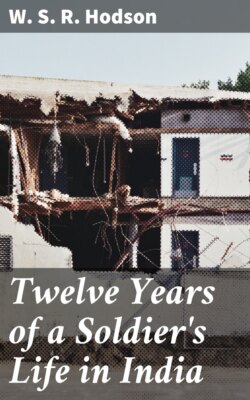Читать книгу Twelve Years of a Soldier's Life in India - W. S. R. Hodson - Страница 20
На сайте Литреса книга снята с продажи.
CHAPTER I.
ОглавлениеTable of Contents
EARLY LIFE.—RUGBY.—CAMBRIDGE.—GUERNSEY.
William Stephen Raikes Hodson, third son of Rev. George Hodson, afterwards Archdeacon of Stafford and Canon of Lichfield, was born at Maisemore Court, near Gloucester, on 19th March, 1821.
As a boy, his affectionate disposition and bright and joyous character endeared him greatly to his family, and made him a general favorite with all around him, old and young, rich and poor. That which characterized him most was his quickness of observation and his interest in everything going on about him. By living with his eyes and ears open, and never suffering anything to escape his notice, he acquired a stock of practical knowledge which he turned to good account in his after-life. With the exception of a short time spent with a private tutor, the Rev. E. Harland, he was educated at home till he went to Rugby, in his fifteenth year. Home life, however, had not prevented him from growing up an active, high-spirited boy, full of life and energy.
His feats of activity at Rugby still live in the remembrance of his contemporaries and the traditions of the school. The following is an extract from a paper in the Book of Rugby School, published in 1856:—
Who does not remember the fair-haired, light-complexioned active man whose running feats, whether in the open fields or on the gravel walks of the Close, created such marvel among his contemporaries. He has carried his hare and hounds into his country's service, and as commandant of the gallant corps of Guides, has displayed an activity and courage on the wild frontier of the Punjaub, the natural development of his early prowess at Crick and Brownsover.
A very similar notice appeared in a periodical during the recent campaign:—
The Rugbœans have had their Crick run. Six miles over heavy country, there and back, to the school gates by the road, is no mean distance to be done in one hour twenty-nine minutes.
There was a day when the gallant leader of Hodson's Horse always led in this run. We think we see "larky Pritchard," as he was familiarly designated, in his blue cloth jacket, white trousers, his well-known belt, and his "golden hair," going in front with his nice easy stride, (for he never had any very great pace, though he could last forever,) and getting back coolly and comfortably to "Bons" when the rear hounds were toiling a mile behind. There never was such a boy to run over, after second lesson, to Dunchurch to see the North Warwickshire, or to give himself a "pipe-opener" to Lutterworth and back between callings over, till the doctor vowed he would injure his heart. How true it is that men who have distinguished themselves most in school sports come out the best at last.
It was not, however, only in active sports that he showed ability. As head of a house, during the later portion of his Rugby life, he gave equal indications of "administrative capacity."
His tutor, (the present Bishop of Calcutta,) speaking of his having been transferred to his house, in which there were then no præpostors, "because, from his energetic character and natural ability, he seemed to Dr. Arnold likely to give me efficient help," continues: "He gave abundant proof that Arnold's choice had been a wise one. Though he immediately reëstablished the shattered prestige of præpositorial power, he contrived to make himself very popular with various classes of boys. The younger ones found in him an efficient protector against bullying. Those of a more literary turn found in him an agreeable and intelligent companion, and were fond of being admitted to sit in his study and talk on matters of intellectual interest. The democrats had got their master, and submitted with a good grace to power which they could not resist, and which was judiciously and moderately exercised. The régime was wise, firm, and kind, and the house was happy and prosperous.
"From all that I knew of him, both at Rugby and afterwards, I was not surprised at the courage and coolness which the Times compared 'to the spirit of a Paladin of old.' I cannot say how much I regret that I shall not be welcomed in India by the first head of my dear old house at Rugby."
From Rugby my brother went, in October, 1840, to Trinity College, Cambridge. Here, as might have been expected from his previous habits, he took an active interest in boating and other athletic amusements, while at the same time he by no means neglected the more serious and intellectual pursuits of the University. He had a very considerable acquaintance with, and taste for, both classical and general literature, but a constitutional tendency to headache very much stood in the way of any close application to books; and, after he had taken his degree in 1844, was one strong reason for his deciding on an active rather than a studious life. The Indian army seemed to offer the best opening, but while waiting for a cadetship, in order to prevent superannuation he obtained, through the kind introduction of Lord de Saumarez, a commission in the Guernsey Militia from Major-General W. Napier, the Lieutenant-Governor, and there commenced his military life. From the first he felt that the profession of a soldier was one that required to be studied, and took every opportunity of mastering its principles.
On his leaving Guernsey to enter the Hon. East India Company's service, Major-General W. Napier bore this testimony to his character: "I think he will be an acquisition to any service. His education, his ability, his zeal to make himself acquainted with military matters, gave me the greatest satisfaction during his service with the militia."
